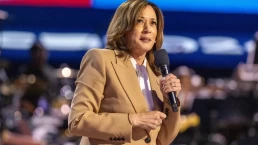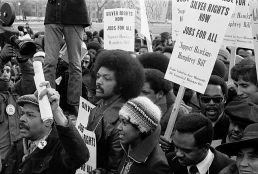To win working-class voters — and possibly today’s election — Democrats need to attack economic elites. But the Kamala Harris campaign hasn’t consistently offered an anti-elite counter to Donald Trump’s right-wing populism.
By Milan Loewer, Jacobin
The Democratic National Convention in August was roundly acclaimed as a great success, presenting a unified front that stretched from Shawn Fain and Bernie Sanders to Adam Kinzinger and Leon Panetta. Ezra Klein saw a party that finally “wants to win.” The vibes were good, almost euphoric. Over the past few weeks, however, Harris has dropped in the polls, and heading into Election Day, many Democrats feel less than confident.
What’s going on? A poll of 1,000 Pennsylvania voters from the Center for Working-Class Politics (CWCP), Jacobin, and YouGov shows that the campaign was tentatively heading in the right direction this summer. It also suggests why, despite Donald Trump’s efforts to alienate voters, the race is still neck and neck.

In late August, the historian Eric Foner wrote that Democrats were attempting to make the election about competing definitions of freedom — about, as Tim Walz said in his acceptance speech, “the freedom to make a better life for yourself and the people that you love,” against the freedom of corporations “to pollute your air” and banks to “take advantage of customers.” UAW president Shawn Fain went even further at the national convention in naming and blaming the villains that stand in the way of a better life for working people: “Corporate greed turns blue-collar blood, sweat, and tears into Wall Street stock buybacks and CEO jackpots,” he argued, adding that Trump was a “scab” who would protect the interests of corporations and billionaires. That same month, the campaign announced a series of commitments to tackle the housing shortage, crack down on price gouging, and raise the minimum wage.
Our survey found strong support for this kind of economic populist messaging and widespread antipathy for billionaires and corporate elites, especially among constituencies that Harris has struggled to reach — union members, voters without a college degree, and blue-collar voters, with whom Harris was trailing by 4, 7, and 19 points respectively in our poll. Despite these clear findings, Harris has pivoted away from anti-elite, economic messaging in the last month of the campaign and backtracked or de-emphasized some of her more popular policies in response to pressure from the business community.
Recent Posts
‘The Siege Must Be Broken’: Countries Called to Ship Fuel to Cuba After Trump Tariffs Struck Down
February 21, 2026
Take Action Now The US Supreme Court’s ruling “implies that Trump’s recent order imposing tariffs on countries selling oil to Cuba exceeds the…
Elite Depravity in Imperial Decline, A Zero Hour Conversation With Richard Wolff
February 20, 2026
Take Action Now “The system self-selects for psychopathy… the most sociopathically obsessive competitor and accumulator of personal power and…
Economics of Health For All: The Plan to Put Health at the Heart of the Global Economy
February 20, 2026
Take Action Now At the World Health Assembly in May, member states may endorse an unprecedented strategy declaring that health is not a cost – but…
The Left Owes a Lot to Jesse Jackson
February 19, 2026
Take Action Now As a movement builder, spokesperson, and candidate for the presidency, Jesse Jackson’s accomplishments were massive. He was one of…




